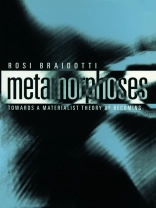The discussions about the ethical, political and human implications
of the postmodernist condition have been raging for longer than
most of us care to remember. They have been especially fierce
within feminism. After a brief flirtation with postmodern thinking
in the 1980s, mainstream feminist circles seem to have turned their
back on the staple notions of poststructuralist philosophy.
Metamorphoses takes stock of the situation and attempts to
reset priorities within the poststructuralist feminist
agenda.
Cross-referring in a creative way to Deleuze’s and Irigaray’s
respective philosophies of difference, the book addresses key
notions such as embodiment, immanence, sexual difference, nomadism
and the materiality of the subject. Metamorphoses also
focuses on the implications of these theories for cultural
criticism and a redefinition of politics. It provides a vivid
overview of contemporary culture, with special emphasis on
technology, the monstrous imaginary and the recurrent obsession
with ‘the flesh’ in the age of techno-bodies.
This highly original contribution to current debates is written
for those who find changes and transformations challenging and
necessary. It will be of great interest to students and scholars of
philosophy, feminist theory, gender studies, sociology, social
theory and cultural studies.
Tabella dei contenuti
Acknowledgements.
Prologue.
1. Becoming Woman or Sexual Difference Revisited.
2. Zig-Zagging Through Deleuze And Feminism.
3. Metamorphoses: Becoming Woman/Animal/Insect.
4. Cyber-Teratologies.
5. Metamorphoses: The Becoming-Machine.
Epilogue.
Bibliography.
Notes.
Index.
Circa l’autore
Rosi Braidotti is Professor of Women’s Studies at the University of Utrecht, and Director of the Netherlands Research School of Women’s Studies












